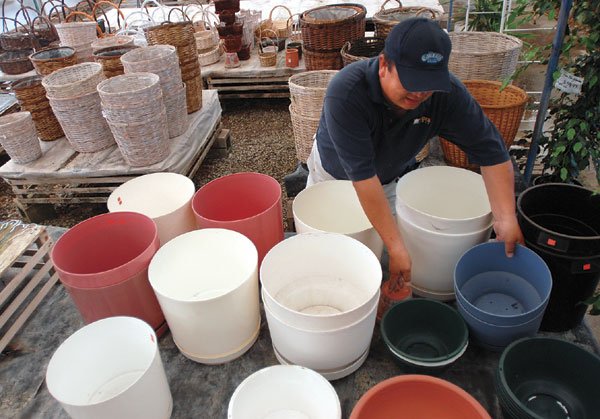A familiar nursery sandwiched between a freeway and farmland is
holding a sale, one that marks the end of an era.
BY Perry Shirley Staff Writer
Gilroy – A familiar nursery sandwiched between a freeway and farmland is holding a sale, one that marks the end of an era.
When the last plant is sold, Ted Uchida – owner of Zen Flower Garden off Monterey Road south of the intersection with U.S. Highway 101 – will shut the doors and turn away from the flower business.
A Gilroy institution for more than 30 years, Zen’s is being sold off following years of being hammered by big-box retailers such as Target and Lowe’s, Uchida said. The move is coming a year after the death of Zenichiro Uchida, the family patriarch, who had seen all the signs of a declining business and told his son that the time was ripe to sell, “not be too greedy and see if you can live off it,” Ted Uchida said.
Carefully cropped bushes, sculpted into shapes, used to adorn the nursery, but the front has been unkempt of late in anticipation of the sale. Of the 100,000 square feet of growing area and showroom, only the front 10,000 square feet remain in use. There, the plants are sparse – but punctually watered every morning – and all the rose plants, once the nursery’s pride, have been sold, save for a few cut flowers.
With the death of Zenichiro Uchida, the family decided to sell and recently closed escrow on the land.
So the nursery, as it were, is effectively on its last days.
Zenichiro Uchida was a Japanese immigrant who helped bridge relationships between his home country and his adopted country.
Uchida was firstly a savvy businessman who chose the flower business because it’s what he knew – he studied at a Tokyo agricultural university and came from a farming community. He literally came to Gilroy with nothing but two suitcases, yet died with a nursery expected to sell for more than $1 million.
Adding to routine seven-day workweeks in the sweltering heat of a nursery, Uchida built his businesses based on vision and a sense of timing.
Agriculture in the South Valley region and Salinas, where Uchida owned his first nursery, was booming in the late 1960s and he was one of the first to launch a nursery. That there were few “restrictions on fertilizers and building permits” helped tremendously, Ted Uchida said. When the South American flower market became highly competitive, his father moved quickly. He opened a distribution center in Miami, importing carnations from Columbia. To save money he sent his son to run the Miami operations and together it became one of the largest carnation suppliers in the nation, covering most of the eastern United States. Just as the market cooled down a few years later, Uchida sold his business for profits.
“He reads the times and the future really well. He always wanted to be the first one in and the first one out,” Ted Uchida said, adding that the sale of the nursery is meant to leave his family well-provided for.
In today’s world success isn’t acquired like it was then. It’s less about working hard seven days a week in a sweltering nursery than about working smart five days a week in a civilized field. In that regard, Uchida has once again left a community well set up to succeed. The sale of the nursery is keeping his grandchildren in college where they are studying to be lawyers, accountants, computer scientists, teachers and graphic designers.
“It’s really a success story because of the people he brought who worked hard and became successful,” Ted Uchida said. “My dad always said that the whole refugee movement won’t be a success if the people that came to the U.S. don’t succeed. Most of the people who came and their offsprings and grandkids are doing very well.”















